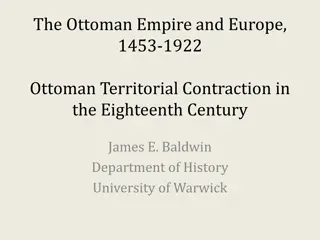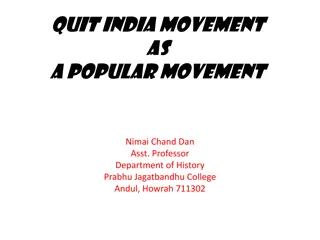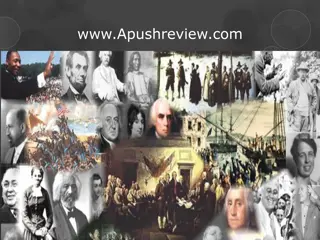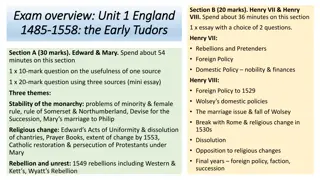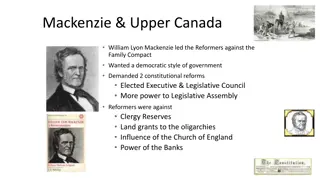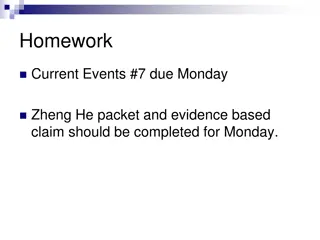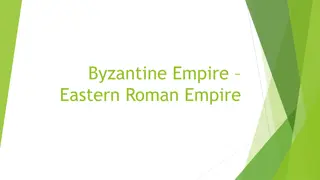Ottoman Empire Territorial Contraction in the 18th Century
Ottoman Empire faced agricultural and fiscal crises in the 17th century, leading to internal rebellions. However, by the mid-17th century, the empire had recovered and experienced further expansion, albeit at a slower rate compared to the previous century. In the 18th century, the Ottomans suffered
2 views • 12 slides
Elizabethan Religious Settlement: Unity Amidst Division
Amid religious division in England, Queen Elizabeth I implemented a Religious Settlement in 1559 to unify the country. The settlement, a blend of Protestant and Catholic elements, aimed to maintain peace and prevent rebellions. Elizabeth's strategic compromise pleased most people, though lingering t
0 views • 14 slides
Overview of Quit India Movement and its Phases
The Quit India Movement was a significant event in India's struggle for independence, marked by various factors leading to its emergence, including the demise of the Civil Disobedience Movement and the rise of nationalist sentiments. The movement escalated in response to the outbreak of World War II
1 views • 9 slides
Colonial Rebellions and Reactions in Early America
The Colonial Rebellions in early America, such as Bacon's Rebellion and the Stono Rebellion, exemplified the growing tensions and conflicts within the colonial society. These uprisings highlighted issues of class struggle, disparity in social status, and led to significant consequences such as the f
0 views • 7 slides
Colonial Era Rebellions and Conflicts in APUSH Review
Explore significant rebellions like Bacon's Rebellion, Pueblo Revolt, Stono Rebellion, and Leisler's Rebellion in the Colonial Era. Learn about their causes, impacts, and historical significance to better understand the conflicts that shaped early American history.
0 views • 10 slides
Tudor Rule: Challenges and Policies of Henry VII and Henry VIII
The Tudor monarchs, Henry VII and Henry VIII, faced various challenges such as rebellions, foreign policy issues, financial management, and religious changes. This content explores the threats to Henry's rule from Yorkist challenges, the success of Henry VII's financial policies, handling of the nob
0 views • 11 slides
Reform Movements in Upper and Lower Canada
William Lyon Mackenzie led the Reformers in Upper Canada against the Family Compact while Louis-Joseph Papineau led the Patriots in Lower Canada against the Chateau Clique. Both movements aimed for a democratic style of government, constitutional reforms, and more power to the legislative assembly.
0 views • 6 slides
The War Between England and Spain: A Historical Perspective
Elizabeth I's reign witnessed strained relations between England and Spain, leading to a conflict rooted in political, religious, and territorial disputes. The Netherlands emerged as a focal point of contention, with both nations vying for control amidst internal rebellions and external pressures. E
0 views • 19 slides
Early Modern European Rebellions: Causes and Consequences
Explore the intricate tapestry of early modern European rebellions, delving into the socio-economic pressures, religious conflicts, and political upheavals that shaped this tumultuous period. Uncover the various forms of riot and rebellion, from aristocratic revolts to popular protests, and unravel
0 views • 23 slides
Decline and Rise: The Ming Dynasty and Zheng He's Voyages
The decline of the Yuan Dynasty marked by corruption and peasant rebellions led to the rise of the Ming Dynasty under Ming Hongwu. The Ming Dynasty brought stability through centralized governance, civil service exams, and land redistribution. Yung Lo, also known as Yongle, expanded China and sponso
0 views • 9 slides
Byzantine Empire and Eastern Orthodox Church Overview
The Byzantine Empire, also known as the Eastern Roman Empire, flourished from 330 CE to 1453 CE under Greek rule. It played a significant role in trade, politics, and culture during the Post-Classical Era, connecting trade routes and reconquering the West under rulers like Justinian. However, challe
0 views • 9 slides
